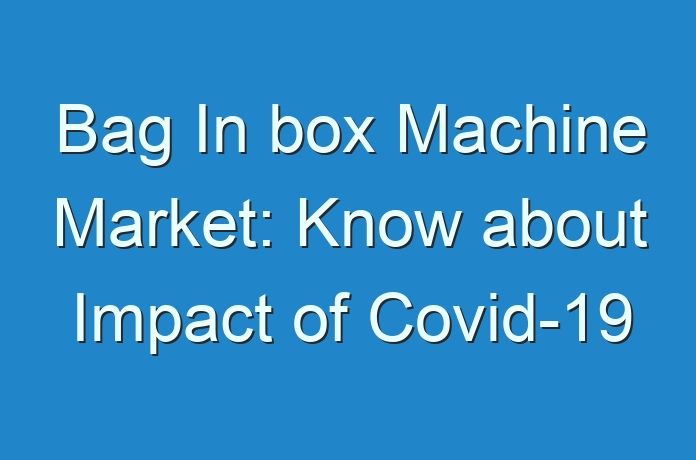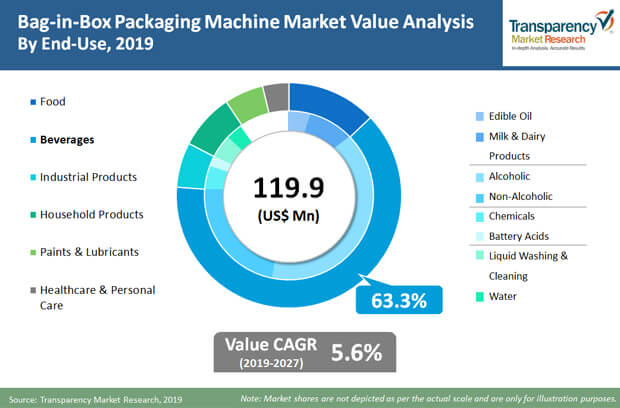
Aseptic Filling Technology in Bag-in-box Packaging Machines to Become More Popular for Food Processing
The global bag-in-box packaging machine market was valued at US$ 119.9 million in 2018. The market is forecast to expand at a CAGR of 5.4% during the forecast period, 2019-2027.
Bag-in-box packaging machines are capable of filling plastic pillow bags of capacity 1.5 liters to 25 liters or more. Automatic bag-in-box packaging machines are in high demand as they help increase the production quantity for any kind of beverage to aid the escalating demand. Bag-in-box is extensively used in the packaging of processed fruit juice and dairy products during the aseptic process. Pasteurized products packed in bag-in-box format are shelf stable and require no refrigeration. The low carbon foot print and extended shelf life of aseptic bag-in-box packaging machines offer more sustainable choices of packaging for various industries including dairy, juice, liquid eggs, and non-food items including certain chemicals and motor oil.
Asia Pacific is currently a prominent region in the global packaging machinery market, accounting for 38.4% of the global market share, and is further expected to expand with a CAGR of 7.8%, during 2019-2027, among all the regions. One of the major contributing factors for this, is the growth in demand for bag-in-box packaging machines in various applications such as food, pharmaceuticals, and consumer goods among others, especially in emerging economies.
Planning to lay down future strategy? Perfect your plan with our report sample here https://www.transparencymarketresearch.com/sample/sample.php?flag=S&rep_id=66326

Beverage industry advancing towards highly effective packaging solution offered by bag-in-box packaging and adoption of automation, propelling the bag-in-box machines market
In some of the largest wine drinking regions such as Europe and North America, bag-in-box containers are gaining foothold. U.S. is expected to be the largest consumer of bag-in-box containers in the world followed by France. Bag-in-box packaging machines will enjoy significant growth in the mature markets, while it will grow speedily in emerging markets. Bag-in-box are alternative packaging containers to traditional ones. Bag-in-box packaging has excellent environmental credentials as well. Bag-in-box is easier to transfer, store, and dispose off in regular waste collection. Bag-in-box provides various dispensing options for wine, juice, water, etc. Bag-in-box packaging uses 92% less plastic than pails. A bag-in-box container is around 88% corrugated box, which is totally recyclable.
Aseptic filling technology in bag-in-box packaging machine is mostly preferred than the non-aseptic filling technology. Aseptic filling technology increases the shelf life of the product packed inside and hence, is more popular than non-aseptic filling technology in bag-in-box packaging machine. Beverages will continue to represent over half of the global aseptic packaging market. Beverage aseptic packaging is expected to benefit from output growth along with increasing applications. This is due to cost effective and sustainability benefits of aseptic packaging. Aseptic packaging is also gaining traction in the food packaging market and is mostly driven by the availability of low particulate and pump-able food.
Beverage industry to witness relatively higher growth among other end-use industries during the forecast period
On the basis of beverage end use, the alcoholic segment is expected to witness lucrative growth and is valued at US$ 48 Mn by the end of 2018. Beverage end-use industries are progressively opting for customized bag-in-box packaging machine solutions for the packaging of wines to be able to stand out among other key players. As industries opt for automatic bag-in-box packaging machine solutions for improved efficiency in the bag-in-box packaging machine, it is expected that the automatic segment will witness an increased demand during the forecast period.
Looking for exclusive market insights from business experts? Request a Custom Report here https://www.transparencymarketresearch.com/sample/sample.php?flag=CR&rep_id=66326
The beverages end-use segment is expected to be the most attractive segment during 2019-2027. Rapid industrialization is the key factor influencing the growth of the bag-in-box packaging machine market. The increasing demand for bag-in-box packaging machines in food and beverage end-use industries is expected to drive the bag-in-box packaging machine market. Some of the bag-in-box packaging machine manufacturers are looking for innovation and are investing in the packaging of the product while some are engaged in acquisitions and collaborations to expand their production business.
A bag-in-box container takes up only 5% of the space that a pail occupies when disposed of. The wine industry has witnessed a paradigm shift, since bag-in-box is introduced. Moreover, juice and other beverages to follow similar trend in the next half of the decade. Alcoholic beverages segment in bag-in-box market are expected to grow, owing to the wide range of practical benefits offered by the bag-in-box packaging machine technology.
On the basis of geography, India is expected to be the most attractive country followed by China in the bag-in-box packaging machine market. The US and Germany bag-in-box packaging machine markets being comparatively mature markets are expected to experience sluggish growth.
Key companies functioning in the global bag-in-box packaging machine market are Smurfit Kappa Group, DS Smith Packaging Ltd., Bosch Packaging Technology GmbH, Triangle Package Machinery Co., ABCO Automation, Inc, Rovema GmbH, IC Filling Systems, Sacmi Imola S.C, Voran Maschinen GmbH, TORR Industries, Kreuzmayr Maschinenbau GmbH, Flexifill Ltd, Terlet BV, and Gossamer Packaging Machinery.





